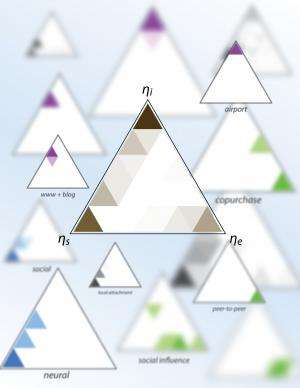Important and complex systems may be more controllable than they appear

We don't often think of them in these terms, but our brains, global financial markets and groups of friends are all examples of different kinds of complex networks or systems. And unlike the kind of system that exists in your car that has been intentionally engineered for humans to use, these systems are convoluted and not obvious how to control. Economic collapse, disease, and miserable dinner parties may result from a breakdown in such systems, which is why researchers have recently being putting so much energy into trying to discover how best to control these large and important systems.
But now two brothers, Profs. Justin and Derek Ruths, from Singapore University of Technology and Design and McGill University respectively, have suggested, in an article published in Science, that all complex systems, whether they are found in the body, in international finance, or in social situations, actually fall into just three basic categories, in terms of how they can be controlled.
They reached this conclusion by surveying the inputs and outputs and the critical control points in a wide range of systems that appear to function in completely different ways. (The critical control points are the parts of a system that you have to control in order to make it do whatever you want - not dissimilar to the strings you use to control a puppet).
"When controlling a cell in the body, for example, these control points might correspond to proteins that we can regulate using specific drugs," said Justin Ruths. "But in the case of a national or international economic system, the critical control points could be certain companies whose financial activity needs to be directly regulated."
One grouping, for example, put organizational hierarchies, gene regulation, and human purchasing behaviour together, in part because in each, it is hard to control individual parts of the system in isolation. Another grouping includes social networks such as groups of friends (whether virtual or real), and neural networks (in the brain), where the systems allow for relatively independent behaviour. The final group includes things like food systems, electrical circuits and the internet, all of which function basically as closed systems where resources circulate internally.
Referring to these groupings, Derek Ruths commented, "While our framework does provide insights into the nature of control in these systems, we're also intrigued by what these groupings tell us about how very different parts of the world share deep and fundamental attributes in common – which may help unify our understanding of complexity and of control."
"What we really want people to take away from the research at this point is that we can control these complex and important systems in the same way that we can control a car," says Justin Ruths. "And that our work is giving us insight into which parts of the system we need to control and why. Ultimately, at this point we have developed some new theory that helps to advance the field in important ways, but it may still be another five to ten years before we see how this will play out in concrete terms."
More information: 'Control Profiles of Complex Networks' in Science by Justin and Derek Ruths: www.sciencemag.org/lookup/doi/ … 1126/science.1242063
Provided by McGill University




















